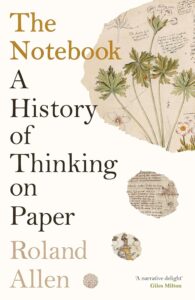
The Notebook: A History of Thinking on Paper
by Roland Allen
Genres: History, Non-fictionPages: 416
Rating:

Synopsis:We see notebooks everywhere we go. But where did this simple invention come from? How did they revolutionise our lives, and why are they such powerful tools for creativity? And how can using a notebook help you change the way you think?
In this wide-ranging story, Roland Allen reveals all the answers. Ranging from the bustling markets of medieval Florence to the quiet studies of our greatest thinkers, he follows a trail of dazzling ideas, revealing how the notebook became our most dependable and versatile tool for creative thinking. He tells the notebook stories of artists like Leonardo and Frida Kahlo, scientists from Isaac Newton to Marie Curie, and writers from Chaucer to Henry James. We watch Darwin developing his theory of evolution in tiny pocketbooks, see Agatha Christie plotting a hundred murders in scrappy exercise books, and learn how Bruce Chatwin unwittingly inspired the creation of the Moleskine.
On the way we meet a host of cooks, kings, sailors, fishermen, musicians, engineers, politicians, adventurers and mathematicians, who all used their notebooks as a space for thinking and to shape the modern world.
In an age of AI and digital overload, the humble notebook is more relevant than ever. Allen shows how bullet points can combat ADHD, journals can ease PTSD, and patient diaries soften the trauma of reawakening from coma. The everyday act of moving a pen across paper can have profound consequences, changing the way we think and feel: making us more creative, more productive - and happier.
Roland Allen’s The Notebook is, as the subtitle says, “A History of Thinking on Paper” — one that ranges pretty far tracking down where we began to use paper as a way to do things we can’t hold in our heads, as a tool for processing information, as a way to test things out, etc. It’s almost completely Western-oriented, focusing on areas like Italy, France and the UK for the most part, discussing various different strands of how notebooks are used. First for financial accounting, then for digesting popular culture and literature, and then evolving into diaries. It also discusses artists’ sketchbooks, the use of notebooks for collecting recipes, and of course, bullet journaling.
It’s the kind of book I love, rambling through the topic and finding examples to discuss, casting them in their context, etc. I found the stuff about da Vinci’s notebooks particularly fascinating, for example (and giggled about the cursing of his terrible handwriting), and of course, Darwin’s notebooks and the famous “I think”.
My favourite chapter of all was the one about ICU patient diaries and how they’re used, though. I didn’t expect this book to make me cry, but the topic hit unexpectedly close to home here, and I found myself crying my way through the last few pages of that chapter.
Definitely recommended if you’re interested in this kind of thing — not just notebooks specifically, but also if you enjoy history through the eye of a single object or set of objects.
Rating: 5/5

I need you to stop adding books to my TBR, thank you very much. (Don’t actually stop).
Oops. 🙂
I did recommend it to someone else and they found it very disorganised, but… not in a way that bothered me, it seems? So caveat emptor.
Interesting! At the beginning of writing the book, I tried to organise the material so that all the different kinds of notebooks from a given time/place were in the same chapters. This became impossible – there was just too much material for each chapter, and the book threatened to become a thousand pages long. So (following the good advice of my most experienced editor) I went looking for stories whose protagonists would stand for bigger developments in the notebook’s story. (As it happens, the ICU-patient-diary chapter was one of the first I wrote that way, and it gave us some confidence that the book might work). So the book is in one way a collection of short stories -– most readers have enjoyed it nonetheless – but it wasn’t always going to be.
The organisation made sense to me, at least! I was pretty spellbound. 🙂
I’m glad that this book worked for you. I’m fascinated by the use of notebooks. I kept a paper journal for decades but switched to journaling on the computer quite a few years ago. That has the advantage of being a quick place that I can figure out things, a place to have a brief conversation with myself. But I have lost some of the longer and deeper modes of thinking that I got when I sat down to do a half-hour of journaling. Also, of course, I’ve lost the change in mood that I can see in my handwriting and the ability to paste random ephemera or to draw a quick diagram when that’s the best way to express something.
Yeah, I’ve been doing morning pages recently and I find that really helpful, even though I do also journal digitally and have since I was 12. Physically writing does add something!
Thanks so much for this review! I’m so glad that you enjoyed the book. Sounds hokey but it really is this kind of write up that makes the grind worthwhile. Which reminds me, I need to stop googling this book and get back to researching the next one…
I really loved it, and it was one of those where I kept telling my wife what I’d just learned (which is a marker of my favourites, haha).